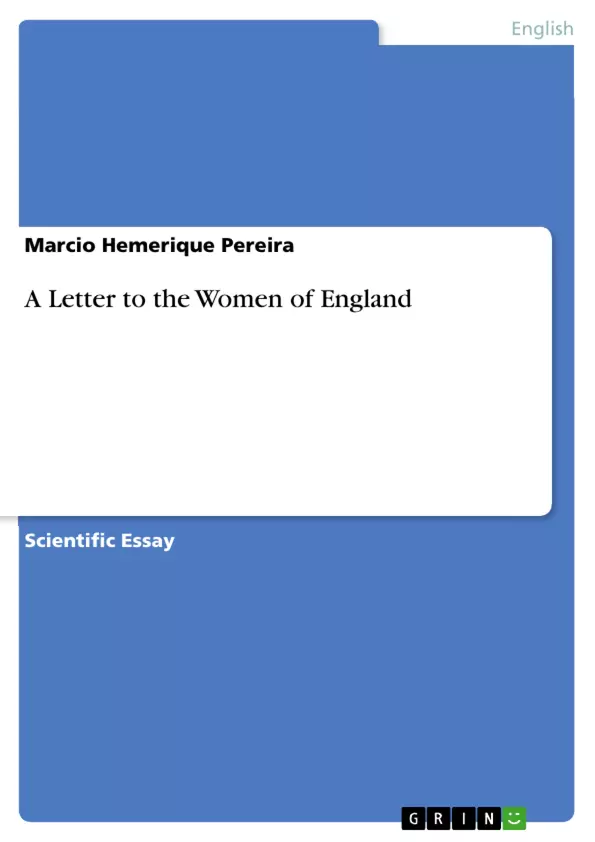Abstract: This essay attempts to increase awareness of the scope of the letter, A Letter to the Women of England on the Injustice of Mental Subordination by Mary Robinson who wrote it to persuade readers towards peace, revealing the warfare threatening the heart and home of women, the historical conditions in which they worked, their subject matter and style, and the ways in which they manoeuvred rhetorically within male-dominated publishing and political arenas. In such case, the poet places the reader in the radical’s shoes and depicts the current social state that privileges the wealthy in order to reveal the conspicuous lack of equality and democracy. In this poem, Mary took advantage of her authority in domestic matters as a woman and nurturer and explicitly identified the government as a threat to both nuclear families and the national family. Women claimed their place in public discourse by publishing poetry that frequently recounted tales of fallen fathers, brothers, husbands, and sons and thus transformed impersonal casualty statistics into actual family members and real trauma. I shall discuss the letter which is a consequence of the sorrows of Robinson and all British women under male domination unjustified, ‘slavery’ and its impact in the British society. Mary Robinson’s work not only advocated a (re)evaluation and reversal of the moral codes to which eighteenth-century women were subjected to but also argued against the educational disadvantages experienced by women.
Key words: British society, Women, eighteenth-century women, poetry.
Inhaltsverzeichnis (Table of Contents)
- A Letter to the Women of England on the Injustice of Mental Subordination
- The 1790s: A Period of War for Equal Rights
- Mary Robinson's A Letter to the Women of England
- Women Writers and the Program of Liberal Feminism
- Robinson's Arguments for Women's Writing
- The British Cultural Revolution
Zielsetzung und Themenschwerpunkte (Objectives and Key Themes)
This essay examines Mary Robinson's A Letter to the Women of England on the Injustice of Mental Subordination, exploring its historical context, its arguments for women's rights, and its impact on the broader debate surrounding women's status in 18th-century Britain. The essay focuses on Robinson's call for greater equality, her critique of the prevailing social and educational structures, and her celebration of the intellectual and creative contributions of women.
- Women's Rights and Equality
- Social and Educational Disparities Faced by Women
- The Role of Women in Public Discourse and Literature
- The Influence of the French Revolution on Women's Rights Movements
- The Impact of Robinson's Work on Later Generations
Zusammenfassung der Kapitel (Chapter Summaries)
- The first section establishes the historical context for Robinson's work, highlighting the turbulent social and political landscape of the 1790s, marked by the French Revolution and the rise of industrialization.
- The second section delves into Robinson's A Letter to the Women of England, focusing on its critique of the subordination of women and its call for a reevaluation of their social and educational roles.
- The third section examines the broader context of women's writing in the 1790s, highlighting Robinson's advocacy for women's authorship and her recognition of the novel as a genre particularly well-suited to female perspectives.
- The final section explores the wider cultural and social implications of Robinson's work, emphasizing its connection to the emerging British cultural revolution and its influence on subsequent generations of women's rights advocates.
Schlüsselwörter (Keywords)
The main keywords and focus topics of this essay are: women's rights, 18th-century British society, Mary Robinson, A Letter to the Women of England, feminism, literature, social and educational equality, the French Revolution, and the British cultural revolution.
Frequently Asked Questions
What is the central theme of Mary Robinson's "A Letter to the Women of England"?
The central theme is the "mental subordination" and social injustice faced by women in 18th-century Britain, advocating for equality and improved educational opportunities.
How did the French Revolution influence Mary Robinson's work?
The revolutionary spirit of the 1790s provided a backdrop of political upheaval and calls for universal rights, which Robinson applied to the specific cause of women's liberation.
Why did Robinson advocate for women's writing?
She believed that writing allowed women to claim a place in public discourse and that genres like the novel were particularly well-suited to expressing female perspectives and experiences.
What does Robinson mean by the term 'slavery' in her letter?
She uses 'slavery' as a rhetorical device to describe the total legal and social dependency of women on men, highlighting the lack of democracy and personal autonomy.
What was the impact of Robinson's work on British society?
Her work challenged prevailing moral codes and educational disparities, influencing subsequent generations of feminist thinkers and contributing to the emerging cultural revolution in Britain.
- Quote paper
- Marcio Hemerique Pereira (Author), 2009, A Letter to the Women of England, Munich, GRIN Verlag, https://www.grin.com/document/153168



